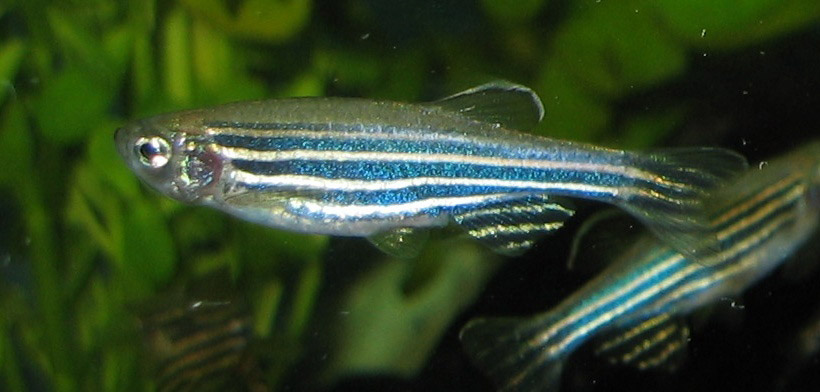"The Contribution of Mutation to Variation in Temperature-Dependent Sprint Speed in Zebrafish, Danio rerio"
Posted on
by

In an ever-changing environment, populations of organisms need to be able to adapt to shifts in their typical habitat conditions in order to survive. Populations are able to evolve in response to environmental changes in part due to genetic differences among individuals. Mutations are a major source of genetic variation within a population that can be critical for adapting to new environmental conditions.
Temperature is a key factor in the environment that changes over space and time. Elevated temperatures can impose directional selection on a population, leading to local adaptation to changing temperatures. Ectotherms such as reptiles and fish are greatly influenced by changes in temperature as they rely on external heat sources to regulate their body temperature. Temperature can biochemically alter many physiological processes in ectotherms, including movement. To measure these changes, scientists can create thermal performance curves that measure how a species’ movement changes across a range of temperatures. Differences in locomotor behavior can be observed among taxa living in different temperature environments. Oftentimes, these differences are heritable.
In this study, Christina Miller et al. from the University of Queensland used the model ectotherm species, zebrafish (Danio rerio), to examine the impact of mutations on swim speed performance in different thermal conditions. They first exposed male zebrafish to a chemical mutagen, N-ethyl-N-nitrosourea (ENU), to induce mutations in their genome. They then bred mutant males with non-mutant females and tested locomotor performance of the mutant and non-mutant male offspring at six different temperatures. To do this, they placed fish in a swim flume chamber that measured the sprint speed of a fish swimming against a gradually increasing current. Each of the 600 tagged fish were assayed at each of the six temperature conditions ranging from 16°C to 34°C, the typical natural temperature variation of their local environment.
Trait expression can be influenced by gene- and/or environment-specific effects. Adaptation to changing thermal conditions is dependent on the trait response to these factors. The authors found that both control and mutant fish produce a similar thermal performance curve in response to increasing temperatures, indicating that the effects of mutations on swim speed were consistent regardless of temperature. The authors also found that mutations introduced variation in swimming speed across temperatures, with some mutant fish performing better at all temperatures than the unmutated fish and others performing worse. The results of this study show that the mutations induced in the zebrafish have environment-independent effects. These findings further support evidence that, when testing across temperature gradients, mutations with concordant effects are more frequent and have a greater effect on trait expression than those with antagonistic or neutral effects.
Abstract
The contribution of new mutations to phenotypic variation and the consequences of this variation for individual fitness are fundamental concepts for understanding genetic variation and adaptation. Here, we investigated how mutation influenced variation in a complex trait in zebrafish, Danio rerio. Typical of many ecologically relevant traits in ectotherms, swimming speed in fish is temperature dependent, with evidence of adaptive evolution of thermal performance. We chemically induced novel germline point mutations in males and measured sprint speed in their sons at six temperatures (between 16°C and 34°C). Heterozygous mutational effects on speed were strongly positively correlated among temperatures, resulting in statistical support for only a single axis of mutational variation, reflecting temperature-independent variation in speed (faster-slower mode). These results suggest pleiotropic effects on speed across different temperatures; however, spurious correlations arise via linkage or heterogeneity in mutation number when mutations have consistent directional effects on each trait. Here, mutation did not change mean speed, indicating no directional bias in mutational effects. The results contribute to emerging evidence that mutations may predominantly have synergistic cross-environment effects, in contrast to conditionally neutral or antagonistic effects that underpin thermal adaptation. We discuss several aspects of experimental design that may affect resolution of mutations with nonsynergistic effects.

Photo credit: Julia Dovi
Author Bio:
Julia Dovi is a master’s student in Ecology and Evolution and a Neurobiology Research Technician at Stony Brook University. Her academic research focuses on the behavioral effects of environmental pollutants on marine species, while her professional research focuses on developmental effects associated with genetic mutations in zebrafish. In her free time, she enjoys playing the piano, tending her garden and hitting the dance floor.